
As much as Ramadan is about building individual God-consciousness (Quran 2:183), its community spirit is undeniable. The blessed month of fasting brings Muslims from virtually every strata of our community together and in contact with each other.
According to a 2017 Pew Research Center survey of U.S. Muslims fasting for Ramadan is common across all the demographic groups that make up America’s 2.15 million Muslim adults. For instance, similar shares of Muslim men and women (77% vs. 82%) say they fast, and there is little difference between Muslims who were born in the U.S. and immigrants (79% vs. 80%).
This is perhaps one reason why the end of Ramadan can mean the loss of community contact. Those faces we saw almost every night during Taraweeh (late night) prayers disappear as they or we go back to weekly attendance at the mosque (or less); the friendly smiles of volunteers are gone - hopefully only until next Ramadan.
But it doesn’t - and shouldn’t be this way. There are ways to maintain that necessary sense of community, so crucial for our faith, and build on what was started in Ramadan. Here are five ways to start.
1. Attend Juma Prayers Every Friday
Find a way to make it work. Talk to your boss or your professor/teacher to move your lunch break around, for example, to attend Juma prayer every Friday. Juma prayer is like getting your foot in the door. Once you have that opening, it will lead to regular contact with the community.
2. Make The First Move
In an ideal world, every mosque or Islamic center would have a few dedicated staff and/or volunteers who reach out to new people at Friday prayers and events. However, this does not happen the majority of the time and in most communities. This is contrary to the example of the Prophet Muhammad, God’s peace and blessings be upon him, who made an exceptional effort to make every single Muslim feel welcomed and a part of the community.
Until we get to a point in the majority of the Muslim community where this Sunnah is once again implemented seriously and effectively, we will have to make the first move and introduce ourselves to others we don’t know. This is no question awkward and uncomfortable. However, we need to view this as a necessity to preserve our relationship with God and our faith overall.
To make it easier, consider bringing a family member or friend with you if you can, which can make the situation less daunting.
3. Volunteer - Alone And Together
Once you have reached the level of regular attendance, consider volunteering for a project, event, or service offered by the mosque/Islamic center. Working on a common cause brings people together in a deeper and more substantial way. It’s often how lifelong friendships, and in some cases even marriages, take place.
Another benefit: People who volunteer tend to not only live longer, but 82 percent of older adults report that volunteering helps them feel less lonely, according to Senior Corps reports.
4. Reach Out To Those Who Are Also New Or Uncomfortable
After committing to above tips #2 and #3, you can now pay it forward by being the person who will be welcoming newcomers at the Masjid/Islamic center. Even better: Develop a team that will serve as a welcoming committee to keep track of and follow up with those who are new to the community. Have them join any online groups or sign up for a newsletter that keeps people updated on upcoming events and issues relating to the community. But make sure to do a monthly check-in as well, reaching out via text or call, to see if they are in need of any assistance, as well as to keep in touch.
5. Eat (And Play) Together
Prophet Muhammad, God’s peace and blessings be upon him, said, “Eat together and not separately, for the blessing is associated with the company” (Ibn Majah).
Don’t restrict your sense of community to only worship or mosque-related interactions and activities. As the Hadith above indicates, eating together is a blessed activity, and you can build a sense of friendship and community by doing that in your home, someone else’s place, at a restaurant, a park, a community center, or elsewhere. Make a habit of doing this at least once a month, even if it is with only one or two other people.
Finally, add an element of fun, and spend some leisure time together as well, whether that is via sports, outdoor activities, indoor experiences, or whatever Halal fun strikes your collective fancy.
It’s not possible to fully recreate the daily sense of community and the experience of spiritual interaction that Ramadan offers. However, committing to at least two of the activities above can help regain at least some of that blessed company and soothe our spiritual isolation until the next Ramadan insha Allah.








Add new comment